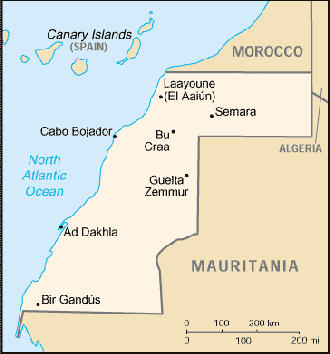
|
Western Sahara
Background:
Morocco virtually annexed the northern two-thirds of Western Sahara (formerly
Spanish Sahara) in 1976, and the rest of the territory in 1979, following
Mauritania's withdrawal. A guerrilla war with the Polisario Front contesting
Rabat's sovereignty ended in a 1991 UN-brokered cease-fire; a UN-organized
referendum on final status has been repeatedly postponed.
Location:
Northern Africa, bordering the North Atlantic Ocean, between
Mauritania and Morocco.
Area: total: 266,000 sq km.
Area - comparative: About the size of Colorado.
Land boundaries: Total: 2,046 km, border countries: Algeria 42 km, Mauritania
1,561 km, Morocco 443 km.
Coastline: 1,110 km.
Climate and Terrain:
Climate: Hot, dry desert; rain is rare; cold offshore air currents produce fog
and heavy dew.
Terrain: Mostly low, flat desert with large areas of rocky or sandy surfaces
rising to small mountains in south and northeast.
Geography - note: The waters off the coast are particularly rich fishing areas.
People:
Population: 261,794.
Ethnic groups: Arab, Berber.
Religions: Muslim.
Languages: Hassaniya Arabic, Moroccan Arabic.
Government:
Government type: Legal status of territory and issue of sovereignty unresolved;
territory contested by Morocco and Polisario Front (Popular Front for the
Liberation of the Saguia el Hamra and Rio de Oro), which in February 1976
formally proclaimed a government-in-exile of the Sahrawi Arab Democratic
Republic (SADR), led by President Mohamed Abedlaziz; territory partitioned
between Morocco and Mauritania in April 1976, with Morocco acquiring northern
two-thirds; Mauritania, under pressure from Polisario guerrillas, abandoned all
claims to its portion in August 1979; Morocco moved to occupy that sector
shortly thereafter and has since asserted administrative control.
Return to Visiting Locations
|
|
Economy overview:
Western Sahara depends on pastoral nomadism, fishing, and phosphate mining as
the principal sources of income for the population. The territory lacks
sufficient rainfall for sustainable agricultural production, and most of the
food for the urban population must be imported. All trade and other economic
activities are controlled by the Moroccan Government. Moroccan energy interests
in 2001 signed contracts to explore for oil off the coast of Western Sahara,
which has angered the Polisario. Incomes and standards of living in Western
Sahara are substantially below the Moroccan level.
Statistics:
Telephones - main lines in use: About 2,000.
Radio broadcast stations: AM 2.
Radios: 56,000.
Railways: 0 km.
Highways: Total: 6,200 km, paved: 1,350 km, unpaved: 4,850 km.
Airports - with paved runways: 3,
with unpaved runways: 8.
|
